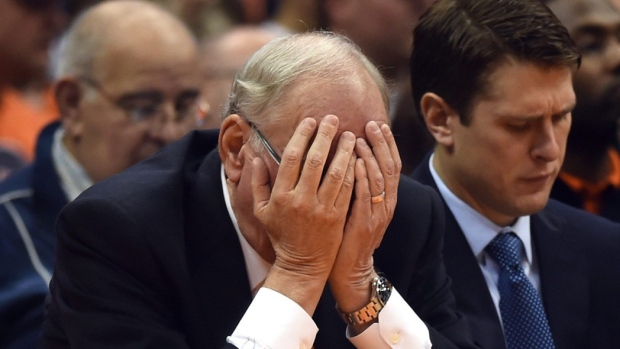Mar 6, 2015
NCAA suspends Boeheim; Syracuse gets five years' probation
Syracuse men's basketball coach Jim Boeheim was suspended for nine games Friday, with the school punished for ignoring the "most fundamental core values of the NCAA" for academic, drug and other violations committed primarily by the hoops program.
The Canadian Press

SYRACUSE, N.Y. - In a sweeping indictment of one of the United States' most decorated basketball programs, the NCAA suspended Syracuse coach Jim Boeheim for nine games Friday and outlined a decade-long series of violations that included improper benefits, academic misconduct and drug-policy failures.
The governing body, saying the school lost control of its athletic department, placed Syracuse on probation for five years for breaking with the "most fundamental core values of the NCAA."
The basketball team must vacate wins in which ineligible players participated. Those players competed during five seasons: 2004-2007 and 2010-2012.
Boeheim, the second-winningest coach in Division I history with 966 victories, has coached at Syracuse for 39 years, having played at the school as well. The 70-year-old coach has been an assistant on the last two gold medallist U.S. Olympic teams.
The punishment includes financial penalties and the reduction of three men's basketball scholarships a year for four years. Recruiting restrictions will be enforced for two years. Boeheim's suspension comprises half the Atlantic Coast Conference season and will be applied next year.
The four-year investigation also revealed violations by the football program, although most of the violations came in men's basketball.
In anticipation of the report, Syracuse chancellor Kent Syverud had announced a post-season ban for this year for the basketball team. The NCAA accepted the ban, meaning next year's recruits won't be affected.
The NCAA said Boeheim, did not promote an atmosphere of compliance and failed to monitor the activities of those who reported to him regarding academics and boosters.
The NCAA said several violations involved students and staff. The report added that academic violations stemmed from the director of basketball operations, who was hand-picked by Boeheim to address academic matters.
"The rule's pretty clear," said Britton Banowsky, chief hearing officer for the NCAA. "The head coach has a duty to monitor activities in his program. Jim Boeheim did dispute that he should be held accountable. There was controversy over that. It (the charge) was not effectively rebutted at all."
In 2012, former centre Fab Melo was declared ineligible for the NCAA tournament days before it started. NCAA spokesman Erik Christianson said the university declared Melo ineligible. Melo also missed three Big East games during the season because of an academic issue.
In the 2012-13 season, former forward James Southerland sat out six games for an academic issue related to a term paper but played in the NCAA tournament and helped lead the Orange to the Final Four.
In its decision, the committee specifically addressed academic integrity.
"Improper institutional involvement and influence in a student's academic work in order to gain or maintain eligibility is a violation of NCAA rules and a violation of the most fundamental core values of the NCAA and higher education," the committee wrote. "The behaviour in this case, which placed the desire to achieve success on the basketball court over academic integrity, demonstrated clearly misplaced institutional priorities."
The committee also found that from 2001-09 the school did not follow its own written policies and procedures for students who tested positive for banned substances. NCAA rules require that if schools have a drug-testing policy, it must include substances on the banned list and the school must follow its policy. Syracuse had a written policy, but both Boeheim and athletic director Daryl Gross admitted they did not follow it.
In addition to the one-year post-season ban for the men's basketball team, the university announced it also had self-imposed other penalties, including elimination of one scholarship for men's basketball for the 2015-2016 season, vacating 24 men's basketball wins (15 in 2004-05 and nine in 2011-12), and vacating 11 football wins from 2004-07 under former coaches Paul Pasqualoni and Greg Robinson.
The school must return to the NCAA all funds it has received through the former Big East Conference revenue sharing for its appearances in the 2011, 2012 and 2013 NCAA men's basketball tournament.
The 94-page NCAA report said a booster developed relationships with men's basketball and football players and members of the men's basketball staff. In some instances, the report said the basketball staff encouraged students to develop relationships with the booster, which resulted in rule violations.
The investigation also found that the booster provided more than $8,000 in cash to three football and two men's basketball students for volunteering at a local YMCA. Additionally, the booster gave money to basketball staff members for appearances or assistance at YMCA events, and those payments were not reported to the school as outside income or supplemental pay, as NCAA rules require.




